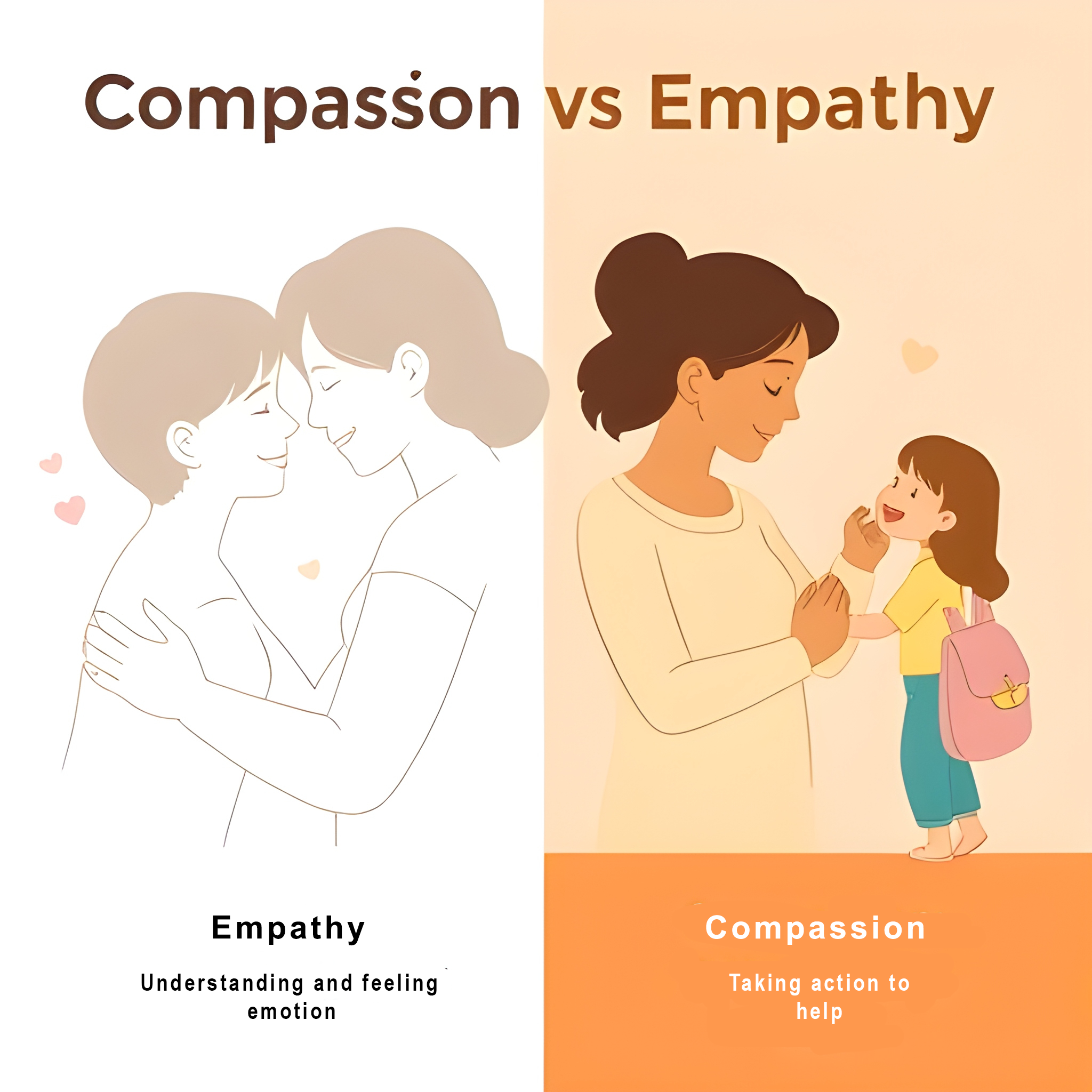Compassion and empathy are often used interchangeably, but they are distinct concepts that play unique roles in human interactions. Both involve emotional connections, yet they differ in how they influence feelings and behaviors.
Empathy is the ability to understand and share another person’s emotional experience by mentally placing yourself in their situation. Compassion goes beyond this understanding by fostering a desire to take action to alleviate someone’s suffering.
This article explores the differences between compassion and empathy, why they matter, and how understanding them can improve your relationships and overall well-being.
Defining Compassion and Empathy
At their core, compassion and empathy share the common goal of emotional connection, but their focus and impact vary.
- Empathy:
Empathy is characterized by awareness and the ability to feel someone else’s emotions as though they were your own. It allows you to step into another person’s perspective and experience their feelings. - Compassion:
Compassion is defined by recognizing someone’s suffering and taking actionable steps to help. While empathy focuses on emotional resonance, compassion emphasizes alleviating pain or distress.
Traits of Compassion vs. Empathy
Here’s a closer look at the key traits that define each:
Compassion Traits:
- Recognizing others’ suffering.
- Acknowledging suffering as a shared human experience.
- Tolerating distressing emotions with resilience.
- Being motivated to provide relief through action.
Empathy Traits:
- Understanding others’ emotions.
- Sharing emotional experiences from their perspective.
- Feeling what others feel on a deeply personal level.
- Often involves emotional resonance without necessarily taking action.
Both traits are essential for nurturing healthy relationships, but their differences reveal unique strengths in fostering connection and support.
Key Differences Between Compassion and Empathy
Understanding the distinctions between compassion and empathy can help clarify how they influence your interactions with others.
Meaning
- Empathy: Allows you to understand and internalize someone’s emotional experience.
- Compassion: Evokes concern and motivates actionable support, often rooted in altruism.
Emotional Response
- Empathy: Creates understanding but may lead to emotional exhaustion if prolonged.
- Compassion: Inspires prosocial behavior and generates positive emotions through action.
Effects
- Empathy: Can sometimes result in burnout or feelings of helplessness.
- Compassion: Leads to purposeful actions, reducing feelings of distress and fostering a sense of accomplishment.
How Compassion and Empathy Work Together
While distinct, empathy and compassion often complement each other. Empathy provides the emotional foundation for compassion, allowing individuals to feel connected and motivated to act.
For example, empathizing with someone’s pain may inspire compassionate behaviors, such as volunteering, offering forgiveness, or providing practical help. Compassion takes the emotional resonance of empathy and transforms it into meaningful support.
Examples of Compassion and Empathy in Action
Examples of Compassion
- Helping in need: Assisting a friend struggling with mental health by performing household chores.
- Volunteering: Donating time or skills to causes that aid suffering communities.
- Forgiveness: Offering grace to someone who has wronged you.
Examples of Empathy
- Active listening: Paying full attention to someone’s emotional experiences.
- Emotional sensing: Picking up on subtle cues to understand someone’s mood.
- Shared feelings: Feeling sadness when a loved one is upset.
Turning Empathy Into Compassion
Empathy can be a stepping stone to compassion. By building self-awareness and adopting a compassionate mindset, you can transform emotional understanding into meaningful action.
Here’s how:
- Build mindfulness: Practice self-awareness to better understand your emotional responses.
- Recognize suffering: Acknowledge when others are in distress and identify ways to help.
- Take action: Translate emotional awareness into acts of kindness, whether small or significant.
- Practice non-judgment: Avoid making assumptions about others’ situations.
By cultivating these habits, you can turn empathy into a powerful tool for fostering compassion in your daily life.
Coping With Burnout: The Dark Side of Empathy and Compassion
Both empathy and compassion, when prolonged or overwhelming, can lead to emotional fatigue.
- Empathy Burnout: Constantly feeling others’ emotions can result in exhaustion, leaving individuals drained and emotionally numb.
- Compassion Fatigue: Prolonged exposure to suffering, common in caregivers, can cause detachment and reduced empathy.
To avoid these challenges:
- Prioritize self-care: Incorporate mindfulness, exercise, and restorative activities.
- Seek support: Reach out to friends, family, or mental health professionals.
- Establish boundaries: Protect your emotional energy to maintain your ability to help others effectively.
Conclusion
Compassion and empathy are both vital for fostering emotional connection and meaningful support. While empathy creates understanding, compassion takes it further by inspiring action to alleviate suffering.
Recognizing the nuances of these emotions can empower you to create healthier relationships, support those in need, and protect your own emotional well-being. By balancing empathy and compassion, you can navigate life’s challenges with both kindness and resilience.
📍 SEO & Content Strategist | Expert in Current Affairs, History, Geography & Education Blogs | Digital Marketing Specialist
Muhammad Talha Mehmood is a seasoned digital marketing specialist, SEO expert, and content strategist with over six years of experience in creating high-impact, research-driven content. As the driving force behind Globaleak.com, he delivers in-depth articles on current affairs, history, geography, and education, helping readers stay informed with accurate, well-researched insights.
🔹 Expertise & Achievements:
✔ SEO & Content Strategy: Specializes in creating authoritative, high-ranking content that aligns with Google’s EEAT guidelines.
✔ Research & Analysis: Covers historical events, geopolitical trends, and educational topics with in-depth research and expert insights.
✔ Proven Track Record: Has successfully worked with global clients, delivering content that enhances brand trust, audience engagement, and search rankings.
✔ Academic Excellence: Holds an MBA in Marketing from IBA, University of the Punjab, and a B.Com (Hons) from Hailey College of Commerce.
✔ Industry Experience: Started his career with Packages Limited, trained under PITB’s E-Rozgar Program, and later became a Team Leader & Trainer at Emenac Group of Companies.
🚀 Passionate about creating impactful content, Muhammad Talha ensures every article is insightful, engaging, and value-driven.
📧 Email: talhamehmood34@gmail.com
🔗 LinkedIn: linkedin.com/in/talhamehmood-34



